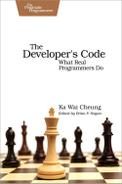| Essay 24 | Work in Small, Autonomous Teams |
Many big companies tout the now overly clichéd line “People are our greatest asset.” It’s nauseating. Many of these same companies identify employees with a badge number, give away gift cards as temporary lifelines to an employee’s quickly fading motivation, and consequently see huge turnover rates. No big deal.
Some companies, especially very large ones, can hire and hire again, replacing a part for another part, to keep the engine churning. They can continue to sign big contracts with other big companies and squeeze all the youthful exuberance out of their new employees for a good year. Once they’ve rung them dry, it’s off to the market once again. More hires, more replacements, more of the same just-good-enough work to keep the ship afloat.
We often look at this corporate phenomena as a result of “big business.” It’s red tape. It’s bureaucracy. It’s meetings. It’s indecision begetting indecision. Yet, all the while, they continue to toe the corporate line: people are their greatest asset.
Truth be told, in my small consultancy, people aren’t our greatest asset. I know full well there are (many) better programmers, designers, thinkers, and writers out there than me. Not one of us is the best at our job. Somebody out there is better.
But what makes us productive is the working relationships that form over time. I’ve sweated, year after year, with nearly the same group of like-minded workers. That sense of familiarity we have within our team means we know how each person likes to work.
Some of us like to work deliberately, cautiously thinking through each line of code. Others like to take big swings, leave a mess, and clean up afterward. Some of us need to work alone longer and fight through a problem solo, while others need more collaboration up front. Over time, each of us complements each other in a different way. We adapt to the people around us. Over time, we start to gel—in the truest sense of the word.
At the same time, that familiarity lets us argue without worrying about hurting each other’s feelings. There is no “feeling each other out” when you’ve been in the trenches with the same army for years. We can fight full-fledged for an idea we believe in without the debilitating worry of hurt feelings. Our meetings are active, engaging, and sometimes heated. We get issues ironed out and come to a resolution. Compare that to the average corporate meeting full of questions and noncommittal answers. In those meetings, avoiding confrontation seems to trump getting to the best answer.
That’s why I advocate that the best environment for programmers is within small, autonomous teams that have very low turnover. You can still find them inside of big corporations, but they’re much easier to spot inside small shops. In today’s landscape, small shops are the ones sprouting out big things, because they can get to decisions quicker, research and learn without the hindrances of corporate red tape, and ultimately build faster. Think of all the hugely successful software used by the masses yet produced by very small organizations. Here’s just a small sliver of them:
-
Campaign Monitor: Email marketing software for web designers
-
Litmus: Email previews and monitoring
-
GitHub: Version control repository for software development projects
-
Braintree: Online payment gateway for SaaS services
-
Basecamp: Project management and collaboration software
-
Angry Birds: Mobile puzzle video game
Their collective familiarity turns a group of pretty good individuals into a singular, great team, producing amazing products.
